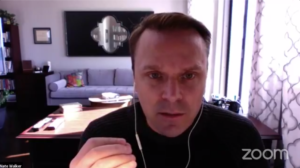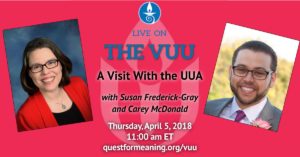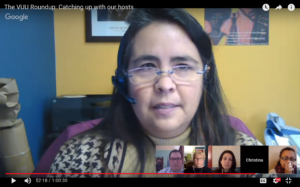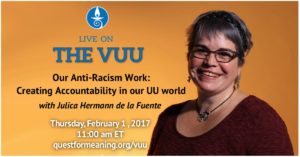Liberation and Salvation
January 10, 2022Rev. Dr. Michael Tino preached this Sermon on December 5, 2021 in the Church of the Larger Fellowship’s Online Sanctuary
Our Universalist ancestors believed that a powerful, radical love awaited them at death, a love so powerful as to be able to cleanse them of even their most vile sins, a love so radical as to be freely available to all. In the days when John Murray ran aground on a sandbar on the coast of New Jersey, it was a wild and heretical theology, this stuff of Universal salvation.
Over the ensuing two hundred and fifty-one years, a theology that holds that all people will ultimately be saved, a theology that rejects the eternal damnation of hell in favor of a reconciliation with a greater love, that theology is not so wild anymore. It is barely even heretical in some corners.
And yet, since Thomas Potter convinced John Murray to preach Universalism in his little chapel, our faith has struggled with the question of what Universalism calls us to in this life, before we die, right here. After all, if we’re all going to be saved anyway, why bother doing anything in this life? Why even bother being good?
Through the generations, our Universalist ancestors came up with decent responses to these questions. And today I want to call us to an answer that Clarence Skinner gave us some 80 years ago.
I don’t always agree with Clarence Skinner, 20th century Universalist theologian. For starters, his history of embracing eugenics is more than a little problematic.
But in particular, I think he led us astray by claiming that big-U Universalism was little-u universal—that we uniquely had a religion for all people and should strive to make it so. That’s modernist, colonizer talk right there, that little-u universal religion stuff. It asks us to point to the existence of a truth that is equally valid for all people, and to claim as that truth a theology of white Europeans and Americans. I don’t believe such a truth exists, much less that white folks would hold it, so I don’t do little-u universal religion.
But when Skinner asked the question “What does Universalism demand of us in this life?” he got to some things I find worthy of holding up.
Universalism, he insisted, call on us to fight the perpetuation of racism. In his 1945 work “A Religion for Greatness,” he wrote that racism is based in selfishness, superstition, and distortion. “If we ‘see life steadily and see it whole,’” he wrote, “we can appreciate all the parts. the part becomes misunderstood only when we see it without relationships, as an end in itself.” Each race, each culture, each difference in humanity, he wrote “has its own genius and each may contribute to a life that is ‘rounded, divine, [and] complete.’”
I believe it is our call to once again make our faith a radical, prophetic, challenge to the way things are. It is time to reclaim our place as the wild heretics pushing society forward, pushing theology forward, pushing humanity forward. It is time to re-think the powerful love our ancestors believed awaited them when they died as a powerful love available to us in the present, while we live.
I believe it’s time to re-think our theology of Universal salvation as a theology of universal liberation, right here.
I believe it’s time for Universalists to claim the radical, powerful love that our ancestors once attributed to God as a possibility of humanity.
Not as an automatic of humanity—we all know that real evil exists in our world, and that systems created by humans perpetuate evil daily—but as a possibility. Which makes our call, as Universalists, making it happen.
In 1915, ten years into his ministry and two decades before he became a professor at Tufts, Clarence Skinner published “The Social Implications of Universalism.” Here’s some of the non-problematic part of what he wrote:
“Universalism was born out of the new humanity; it is the gospel of the new heaven and the new earth. It throbs with hope. It was part of the great world movement to reinterpret life in terms of a regenerated, buoyant, self assertive human nature. Universalism believes in the world and in its potential goodness. It repudiates the gloomy and disastrous outlook of the old anti-social theology. It is not frantically searching for an escape from life.”
He continues, “Only those theologies which frankly and persistently align themselves with the world, and openly champion its potential goodness, can logically enter the great reformation of the twentieth century. They alone believe that salvation comes in, by and through a saved world. This is social salvation. All others believe that salvation comes by escaping from a world which is inherently unsavable. That is the individualistic, anti-social, mediæval faith. Goethe once said that the ideal is not an escape from reality but a completion of it. The Universalist conception of religion is not that of an escape from reality, but that of the harmonious and spiritual development of all the elements of real life.”
How do we persistently align ourselves with the world? How do we openly champion the potential goodness in our midst? What is our call? It is the collective liberation of all of humanity.
And not just the spiritual liberation of all of humanity, but the physical and emotional liberation of humanity as well. These things cannot be separated.
As long as we are not naming the white supremacy culture in our midst and openly, explicitly, constantly working to dismantle it, we are failing in our call to champion the goodness of humanity.
As long as listening to the voices of those who have experienced marginalization and naming the ways in which racism is systematized in our society are somehow controversial things to do, we are failing in our call to champion the goodness of humanity.
As long as violent, extractive capitalist systems are allowed to make policy—to block action on climate change, to enact colonial foreign policies, to abrogate the bodily autonomy of people with uteruses, to let this deadly virus run rampant in communities of color and schools because we insist that certain adult bodies are needed to show up for work, we are failing in our call to champion the goodness of humanity. These evils exist because someone is making money off them, and their money is power in a society that falls short of the radical love that is possible in this world.
And as long as our siblings are locked behind bars, as long as their bodies are fuel for the fire of our prison-industrial system, as long as we insist that punishment by dehumanization is a necessary response to breaking laws, as long as our nation’s constitution allows a loophole in our abolition of slavery for incarcerated people, we are failing in our call to champion the goodness of humanity.
And let’s make no mistake—the systems of injustice that I’m talking about today, these systems are using the very beings—the bodies and the spirits—of black people, indigenous people, people of color, of poor people, of disabled people, of queer people, of women and transgender people, as fuel for the creation of wealth for a very small number of folks.
Let me repeat that—the very bodies of those who are marginalized in so many ways around the world are being used as fuel. Our systems dehumanize people and then turn them into commodities to be used.
As surely as the fires of hell that John Murray rejected burned, human systems of evil burn.
And so it is our call as Universalists to reject that fire consuming our siblings.
It is our call as Universalists to amplify the radical, powerful love that we know humanity is capable of.
It is our call as Universalists to work for the liberation of all of humanity—for the spiritual emancipation that Clarence Skinner wrote of in 1915 as well as the physical emancipation so desperately needed in 2021.
“Light the fuse,” Skinner wrote, “and the fire will reach the bomb.” It is time to set off a love bomb on our world. It is time to act like we are worthy of the God of John Murray and Hosea Ballou, the God of Olympia Brown and Joseph Jordan, the God of Gloster Dalton and Amy Scott. Like we are worthy to call ourselves inheritors of a faith in which all are saved, in which all are free, in which all are loved.
It is time for us to practice radical, powerful, life-saving love. Liberation and salvation. Right here. Right now. Over and over again.
234: F-Bombs to Pipe Bombs: The Consequences of Political Contempt with Nate Walker
October 25, 2018Podcast: Download (Duration: 1:00:35 — 55.5MB)
Subscribe: More

As the nation grapples with the terrorist attempts of President Trump’s political adversaries, we will reflect on how the totalitarian rhetoric and behavior in the political discourse in the United States correlates with a startling rise in social hostilities and violence.
Rev. Dr. Nathan C. Walker is the community minister for religion and public life at the Church of the Larger Fellowship and can be reached via his website www.NateWalker.com.
The VUU is hosted by Meg Riley, Michael Tino, Aisha Hauser and Christina Rivera, with production support provided by Jessica Star Rockers. The VUU streams live on Thursdays at 11 am ET.
Note: This audio has been slightly edited for a better listening experience. View the live original recording on Facebook.
216: A Visit With the UUA with Susan Frederick-Gray and Carey McDonald
April 5, 2018Podcast: Download (Duration: 1:00:39 — 55.5MB)
Subscribe: More

Join our hosts as they visit with UUA President Rev. Susan Frederick-Gray and UUA COO Carey McDonald about what’s new with the Unitarian Universalist Association.
Show links:
A link to The Promise and the Practice of Our Faith for Black Lives of UU (BLUU): https://www.uua.org/giving/areas-support/funds/promise-and-practice
UUA General Assembly is in Kansas City this year, June 20-24: https://www.uua.org/ga Lots of culture shifts in the UUA will be evident there.
UUA leaders alarmed by conflicts reported by religious professionals of color: https://www.uuworld.org/articles/uua-leaders-alarmed-conflicts
The VUU is hosted by Meg Riley, Michael Tino, Aisha Hauser and Christina Rivera, with production support provided by Jessica Star Rockers. The VUU streams live on Thursdays at 11 am ET.
Note: This audio has been slightly edited for a better listening experience. View the live original recording on YouTube.
208: The VUU Roundup: Catching up with our hosts
February 8, 2018Podcast: Download (Duration: 59:30 — 54.5MB)
Subscribe: More

Join The VUU hosts–Meg Riley, Aisha Hauser, Christina Rivera and Michael Tino–as they catch up on what’s new in the UUniverse. It’s a UU roundup. (Or maybe a Rouundup?)
Show notes:
Link to the recording of Denny Davidoff’s memorial. https://locallive.tv/archives/23911
Denny Davidoff Memorial Fund: http://www.meadville.edu/donate/denny
UUA Board statement about the Moderator Search hhttps://www.uua.org/uuagovernance/board/announcements/statement-2019-moderator-election
Susan David’s short video on embracing discomfort: http://t.ted.com/kZ3eEcm
The book Honest Direct Respectful: https://www.amazon.com/Honest-Direct-Respectful-Simple-Change/dp/193320429X
The book So You Wanna Talk About Race: https://www.amazon.com/You-Want-Talk-About-Race/dp/1580056776/ref=sr_1_1?s=books&ie=UTF8&qid=1518281778&sr=1-1&keywords=so+you+wanna+talk+about+race
The VUU is hosted by Meg Riley, Michael Tino, Aisha Hauser and Christina Rivera, with production support provided by Jessica Star Rockers. The VUU streams live on Thursdays at 11 am ET.
Note: This audio has been slightly edited for a better listening experience. View the live original recording on YouTube.
207: Our Anti-Racism Work: Creating Accountability in our UU World with Julica Hermann de la Fuente
February 1, 2018Podcast: Download (Duration: 58:23 — 53.5MB)
Subscribe: More

Join our hosts as they chat with Julica Hermann de la Fuente about anti-racism work and accountability in Unitarian Universalism.
Show notes:
You can download the Western States Dismantling Racism Resource book here:
http://www.westernstatescenter.org/tools-and-resources/Tools/Dismantling%20Racism
And if you download the PDF, make a donation to support the work!
Interested in joining Julica’s POC covenant group at the CLF? This is for people of color only. Here is the link: https://www.questformeaning.org/poc-covenant-group/
Learn more about Creating Theology Together at the Fahs Collaborative: https://www.facebook.com/TheFahsCollaborative/
**
The VUU is hosted by Meg Riley, Michael Tino, Aisha Hauser and Christina Rivera, with production support provided by Jessica Star Rockers. The VUU streams live on Thursdays at 11 am ET.
Note: This audio has been slightly edited for a better listening experience. View the live original recording on YouTube.
Hope in the Possibilities of Life
September 19, 2017Dear Reverend Meg,
It is with great honor and admiration that I now pen this missive. As it reaches your hands and my words now become your thoughts, I would hope that it finds you with the same peace of mind I now have as I sit here writing it.
First and foremost, I want to thank you for the powerful pieces that you write in Quest every month. I feel like you are speaking directly to me every time. I’ve been a member of the CLF since 2004. I haven’t been as active as I used to be when I was writing pieces and corresponding with Jean Rzepka, who was the minister back then. I have just had a really rough time the last few years. This piece that you wrote on resilience moved me to pick up my pen.
I’ve been incarcerated twenty years straight so it is a topic I know well! I’m forty-five years old and have spent twenty-five in prison. This is my second time. The first time I did five. But you know, Meg, as I look back, it is clear to me now that I am a conscious spiritual man that, even when I was outside the gates, I was in “prison” in one way or another: be it the prison of poverty, drug abuse, family dysfunction, sexual abuse, or hunger. These were all prisons to me. Many of these were worse than the actual prison I’m in now, but the one thing that got me through all that, before I even understood what it was, is resilience.
I never knew the extent of my capabilities until I was tested by my circumstances. I haven’t broken yet after all these years, though I’ve seen several people commit suicide that had even less time than me. This is why I so clearly identify with your piece in the Quest. You were right on point. I’ve had to wake up willing to face another day in a place where love is probably something I’ll never know, and where fear is something I’m forbidden to show. I’ve had to “will” myself not to become the “beast” that I’ve seen so many lost souls in here become. Being caged like an animal will cause someone with a weak mind to become an animal.
I came here a drug addicted mad man with a “death wish.” I’m now a down to earth man with a “life wish.” I can tell you that I account for this transformation by having been introduced to Unitarian Universalism.
I’ve sought to build on it by joining the CLF. In doing so, I found a home, somewhere I don’t have to worry about being judged or criticized because I believe different than someone. I found a place that gives me hope in the possibilities of life going forward, and a place where real love in its purest form exists. Thank you, Meg!
I’ll close for now, but I’ll be in touch. I’m writing a book called A Testament to Faith: Living the Seven Principles in Prison. I’ll let you know when it’s done. At any rate, enclosed you will find some writings from my cell mate. Could you please send him a New UU packet as well?
Your in Love and Solidarity,
Kenneth ___ ___
Namasté!
Charlottesville is Us
August 13, 2017This morning the nation must look squarely at images of people marching through Virginia with hateful slogans, confederate flags, and Nazi swastikas, who proudly proclaim that White Lives Matter and scream hateful epithets about Jews and gays and immigrants, who believe that slavery reflected a natural order. Some will say, in coffee hours in Unitarian Universalist congregations, that THOSE people are the white supremacists and people like Unitarian Universalists should not call ourselves that because it is confusing, people might think we are like them. I dearly hope those words will not be spoken from our pulpits. Read more →
Renew Your Membership
We invite you to join your fellow CLFers to renew your CLF membership and stewardship of the CLF for another year.
Support the CLF
Can you give $5 or more to sustain the ministries of the Church of the Larger Fellowship?
Newsletter Signup
About
Quest for Meaning is a program of the Church of the Larger Fellowship (CLF).
As a Unitarian Universalist congregation with no geographical boundary, the CLF creates global spiritual community, rooted in profound love, which cultivates wonder, imagination, and the courage to act.
Contact
Church of the Larger Fellowship Unitarian Universalist (CLFUU)
24 Farnsworth Street
Boston MA 02210



